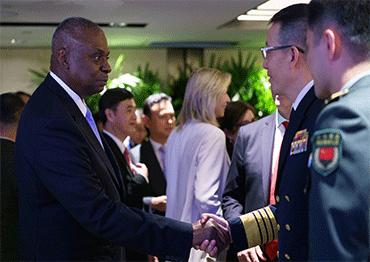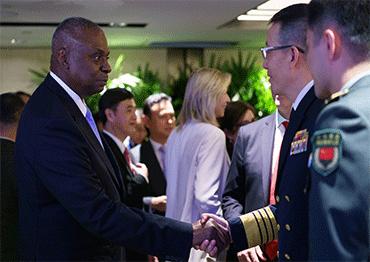China’s Defense Minister Dong Jun sharpened China’s warning against “Taiwan independence forces” at the annual Shangri-La Dialogue

China’s Defense Minister Dong Jun (right) meets US Defense Secretary Lloyd Austin (left) during a ministerial round-table meeting at the annual ShangriLa Dialogue in Singapore, June 1, 2024 (Photo by VCG)
In a keynote speech delivered on June 2 at the 21st Shangri-La Dialogue in Singapore, China’s Defense Minister Admiral Dong Jun accused the US of flaring up tensions in Asia – whether in the Taiwan Strait or the South China Sea, though without directly naming either.
Since its establishment in 2002, the Shangri-La Security Dialogue (SLD) has become Asia’s most important and influential annual defense dialogue, bringing together defense ministers and military chiefs from across the region to discuss security matters. China first participated in the annual event in 2007 and started to send its defense minister in 2011 in the spirit of increasing engagement with regional countries on security affairs.
But as the US started to adopt an antiChina stance under the administration of former president Donald Trump, the forum, with its agenda set by the Londonbased International Institute for Strategic Studies (IISS), is increasingly perceived by China as an unfriendly event that serves to provide a platform for Washington and its allies to push forward their narratives on security matters regarding China. This year, Philippine President Ferdinand Marcos Jr. delivered the opening speech of the Shangri-La Dialogue, in which he reasserted the country’s territorial claims in the South China Sea that are disputed by China.
In response, China has become more assertive in laying out its own vision of global security in the past couple of years. This year, against the backdrop of escalating tensions in the Taiwan Strait and the South China Sea, China has become particularly articulate and assertive about its stance on relevant issues.
South China Sea
During his speech on June 2, Dong said people in the Asia Pacific are against any attempt to turn their countries into vassal states or drawing them into bloc confrontations and hope to live in an equal and orderly multipolar world. Stressing that “a certain country,” without naming the Philippines directly, emboldened by outside powers, has broken bilateral agreements and its own promises, made premeditated provocations and created false scenarios to mislead the public, Dong said that the country has also ignored the overall interests of the region and violated the ASEAN Charter by allowing an outside country to deploy a mid-range missile system. Saying that China has exercised great restraint in the face of such infringements and provocations, Dong warned that “there is a limit to China’s restraint.”
In his speech, Dong emphasized the importance of drawing upon Asian wisdom to cultivate consensus and seek common ground while reserving differences. “We do not allow hegemonism and power politics to harm the Asia-Pacific region, we do not allow geopolitical conflicts or cold and hot wars in the region, and we do not allow any country or force to create war and chaos here,” Dong said.
Taiwan Question
On the Taiwan question, Dong used even harsher rhetoric. Systematically expounding on the historical and legal basis of China’s stance that Taiwan is an inalienable part of China, Dong said that China has always been committed to peaceful reunification, but this prospect is being undermined by “Taiwan independence” elements with the collusion of external forces.
He stressed that the PLA has the strength and is well-prepared to deal with any “Taiwan independence” separatist activities. The PLA launched extensive military drills code-named Joint Sword-2024A on May 23 and 24 after Lai Ching-te of the pro-independence Democratic Progressive Party unexpectedly adopted assertive rhetoric on cross-Strait ties in his inauguration speech as Taiwan’s top leader on May 20, referring to the island as a country and saying that Taiwan and the Chinese mainland “are not subordinate to each other.”
Dong directly addressed Lai’s inauguration speech, saying that it exposes his ambition to seek Taiwan independence. Dong accused some countries of selling weapons to Taiwan and attempting to “use Taiwan to contain China.” Dong warned that anyone who dares to split Taiwan from China will “end up in self-destruction.”
Earlier in April, the US approved a huge military aid package for Taiwan and the US’s Indo-Pacific allies, including US$1.9 billion for replenishing their military equipment and training and US$2 billion for “foreign military financing”. On May 20, China announced it was adding three US firms, General Atomics Aeronautical Systems, General Dynamics Land Systems and Boeing Defense, Space and Security, to its list of “unreliable entities.” Companies on the list are barred from engaging in Chinarelated import or export activities and are banned from making new investments in China.
During the question-and-answer session that followed his speech, Dong further elaborated on the Taiwan question, even as the session’s moderator, Dr Bastian Giegerich, chief executive of the IISS, interrupted him twice in an effort to nudge him to address other questions. “Taiwan is the core of China’s core interests; since I’m asked about it, I have to answer it responsibly,” Dong told Giegerich.
Reiterating that the PLA is well-prepared to defeat Taiwan’s secessionists and their patrons, Dong employed several Chinese idioms, saying that “it will be as easy as catching a turtle in a jar, nothing to sweat about,” and that their efforts to try to fight the PLA will be as futile as “the praying mantis that tries to block a cart with its arm.” Dong did not name any specific country, but it is obvious that he was referring to the US. In the past couple of years, the Biden administration has been actively enlisting allies and partners to form an alliance against China. The frequent visits by US officials as well as its arms sales to Taiwan are seen as a carefully designed maneuver to gradually undermine the one-China doctrine adopted by the United Nations and most of the countries in the world, including the US.
Defense Ministers’ Meeting
Dong’s remarks at this year’s ShangriLa Dialogue are much harsher than those made by China’s defense chiefs in previous years. According to Xiang Haoyu, a research fellow at the China Institute of International Studies, Dong’s remarks served to send a clear message on relevant issues. “Dong’s speech directly addressed the issues without diplomatic rhetoric and conveyed China’s stance and confidence in a straightforward manner,” Xiang told domestic news outlet guancha.cn on June 2. “It aims to create a strong deterrence effect on the ‘Taiwan Independence’ forces and external interference forces,” Xiang added.
Dong’s speech was made after he met with US Defense Secretary Lloyd Austin on the sidelines of the Shangri-La Dialogue on May 31. It was the first time the two defense chiefs had met in person, and the meeting lasted for 75 minutes. Topping the agenda were the tensions between China and the Philippines in the South China Sea and the Taiwan question.
According to the Xinhua News Agency, Dong urged the US not to support “Taiwan independence” by providing military aid and sending wrong signals. On the South China Sea disputes, Dong said that China is committed to resolving disputes with the Philippines through consultations on an equal footing, but will never ignore acts that escalate provocations. Dong also called on the US to meet China halfway to “earnestly implement the consensus reached by the two heads of state and explore a correct way for the two militaries to get along.” Zhu Qichao, a researcher at the National Defense Technology Strategic Research Institute of the National University of Defense Technology, told NewsChina that the meeting between the defense ministers of China and the US convey positive signals of the efforts from both sides to stabilize the development of military relations.
New Arms Sales
But it appears that neither Dong’s tough talk and the meeting with the defense chiefs of the two countries had any impact on the US in terms of increasing support for Taiwan. On June 3, media in Taiwan reported that representatives of 27 American arms contractors had arrived in Taiwan, who would meet with Taiwan’s leader Lai Ching-te and attend a forum aimed at “strengthening cooperation on defense technologies.” The next day on June 4, Time magazine published an interview with US President Joe Biden, who said that he would not rule out the possibility of sending troops to Taiwan. However, Taiwan media noted that Biden said it would “depend on the circumstances” and reiterated the US policy of “not seeking independence for Taiwan.” On June 5, the US government approved two potential arms sales to Taiwan of F-16 aircraft parts and related equipment worth a total of US$300 million, making it the 14th US arms sale to the country since Biden took office in 2021. The move immediately drew condemnation from China’s foreign ministry.
“The Biden administration appears to be laying the groundwork for a conflict that China claims it doesn’t want, but which the US – by accident or design – seems set to provoke,” said Scott Ritter, a former US Marine Corps intelligence office, in an article published by Energy Intelligence Group on June 6.

 Old Version
Old Version
